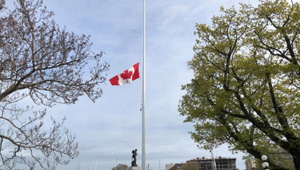
Monday May 31, 2021 | LANGFORD, BC [Updated 8 pm May 31, 2021]
RECAP & COMMENTARY | by Mary P Brooke, Editor, Island Social Trends
It was only late last week that the news of discovering a burial site containing the bodies of 215 children at a former Indian Residential School broke. It has not only rocked BC, but people across Canada and in countries beyond our borders.
Within 24 hours of the May 27 news announcement, Premier John Horgan issued a statement detailing his horror and heartbreak over the findings on the grounds of the former Kamloops Indian Residential School. The building and property are now maintained as a historical museum site.
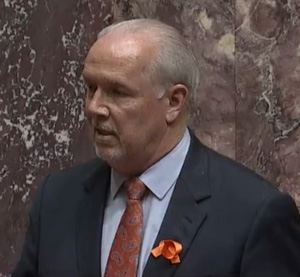
Over the weekend, there was continued news coverage on TV and in mainstream press, and Twitter was abuzz with commentary and condolences from people in government, organizations and communities in BC and across Canada.
Prime Minister Justin Trudeau requested that Canadian flags on all federal government buildings be lowered to half-staff. Most governments and organizations at other levels have followed suit, in a mass wave of sagging sad flags. It’s the smallest of gestures, surely no match for the gravity of the findings.
But it’s a first step for the fuller Canadian society to begin coming to terms with the sheer depravity of the fate that was borne upon likely many hundreds of young Indigenous people across this country during the many decades of operation of these ‘schools’ that were government-funded (in part) and operated (in most cases) by the Catholic Church.
The Truth & Reconciliation Commission conducted an inquiry over about eight years (2007-2015), hearing the many stories and accounts of ‘missing and murdered’ Indigenous people. The TRC created a historical record of the residential schools system, which is, however, still thought to be incomplete (with the Kamloops discovery underscoring that point). The knowledge of children-gone-missing is not news to anyone who was involved in that process. There were 94 recommendations produced out of that formal inquiry (at a cost of $72 million), which many Indigenous leaders say have barely been acted upon.
Today Trudeau commended the British Columbia government for taking leadership with Indigenous reconciliation issues in Canada. It was, in fact, the BC government that funded the ground-sonar exercise that led to confirming the 215 bodies — a rather precise technology if we’re to believe an exact number of remains and even the range of ages (based on body size, one presumes) that has so far been revealed.
A massive project — at great financial cost along with the incredible emotional trauma that will likely unfold in waves — lies ahead, combining the forces of science along with the BC Coroner’s office and the RCMP.
Commentary on South Vancouver Island:
Here on south Vancouver Island various comments and statements have been made over the weekend and today, including these (excerpts):
“This collective journey speaks to the truth of the residential school system as a mechanism of genocide against Indigenous peoples across Canada, and takes that knowledge and uses it as a force for change in our communities today.” ~ Candace Spilsbury, Board Chair, Cowichan Valley School District
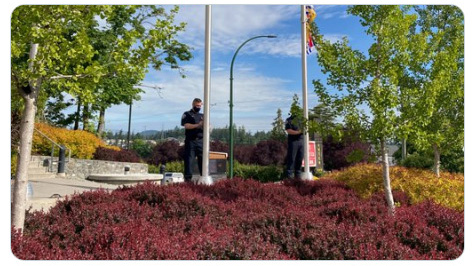
With respect and a heavy heart, our flags are at half mast in recognition of the tragic discovery of the 215 Tk’emlups Nation children lost, their families, and the survivors.” ~ Town of View Royal
[Caption: Firefighters Gray (Tsartlip) and Banman (Metis) lowered the flags at View Royal town hall.]
“We feel grief, heartache and outrage. Children take from their homes never got to return home. Taken from families, friends and communities that loved them. The consequences of these atrocities are felt to this day.” ~ Premier John Horgan (MLA for Langford-Juan de Fuca).
“More than words, we need actions from this government. BC needs trauma and healing services, resources for restoring our languages, all resources needed to restore our houses of culture and governance immediately available.” ~ Adam Olsen, MLA (Saanich North and the Islands), BC Green Party
West shore area / Sooke School District 62:
“All flags at schools in the Sooke School District 62 will fly at half-mast to recognize the tragedy most recently discovered at a former residential school by the Tk’mlúps te Secwépemc First Nation, as well as in memory of the thousands of children sent to residential schools across Canada whose lives were taken and forever changed. As a school district, we offer you our support and promise to continue providing all children with opportunities to improve understanding and respect for Indigenous peoples,” wrote Sooke School District 62 Superintendent Scott Stinson today.
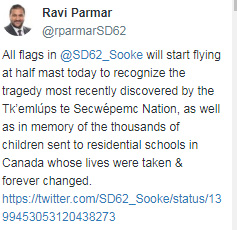
In a letter to parents dated May 31, 2021: “Please reach out to your class teacher, school principal or counselor if you feel that your child or your family could use some support during this time. Additionally, a national Indian Residential School Crisis Line has been set up to provide support for former students and those affected. Emotional and crisis referral services can be accessed by calling the 24-hour national crisis line: 1-866 925-4419.”
SD62 hopes people will wear orange today or any day this week, as part of honouring the pain that is being experienced this week in particular, on top of the many decades of agony that has been experienced by Indigenous peoples generally in silence or unbelieved.
Over the past several years SD62 has been particularly attentive to addressing the needs of Indigenous learners and working hard to improve graduation rates.
Ongoing issue:
If there is any good to come of the tragedy that took place at the Kamloops Indian Residential School over many decades (1890-1969 under operation by the Catholic Church with student attendance peaking at 500 in the 1950s, and from 1969 to 1978 as a day school under direction of the federal government) it’s that the magnitude of horrors there has now burst open like a sore upon the Canadian consciousness about the prejudice that not only lived large in Canadian society during its founding first century (and arguably still since) but that action is now required. If those children suffered for anything, it was to bring this moment alive in history.
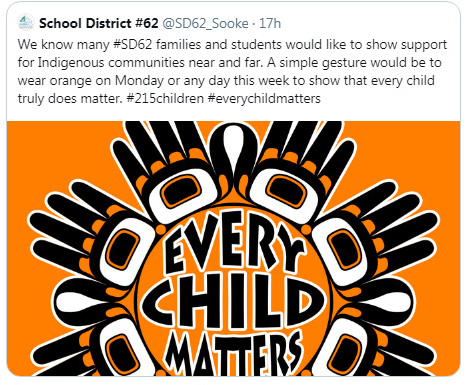
The news of Indian Residential Schools has skyrocketed to the top of mainstream Canadian social issues literally overnight (though it has long been an issue for those most directly involved as students, families, First Nations, and communities).
There were strong words in this regard today from Provincial Health Officer Dr Bonnie Henry: “It’s not something that happened to First Nations children and families, this is something that we did to First Nations children and families. We are all implicated in this tragedy.” See full transcript of Dr Henry’s 3.5-minute speech in response to the Kamloops Indian Residential School news.
News coverage:
The news emerging since this past weekend will no doubt continue to be covered attentively by most if not all media.
Here at Island Social Trends we will cover the news of this issue over time within the same mission we have followed since starting our series of publications in 2008, i.e. highlighting the social and economic trends, with insights about how people and communities are affected.
===== About the Editor: Mary P Brooke has been covering the news of the west shore up close since 2008, and the SD62 school district at the board level since 2014. The publication series has included MapleLine Magazine (2008-2010), Sooke Voice News (2011-2014), West Shore Voice News (2014-2020), and now continuing as Island Social Trends (2020 to present).
===== LINKS:
Tk’emlúps te Secwe̓pemc First Nation (Kamloops area, in BC south Interior)
T’Sou-ke First Nation (Sooke area, south Vancouver Island)
Truth & Reconcilation Commission (federal government page)
National Centre for Truth & Reconciliation (University of Manitoba)






